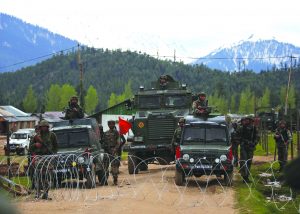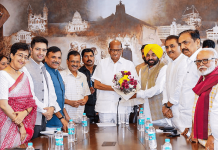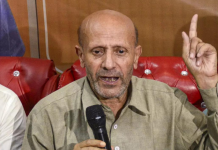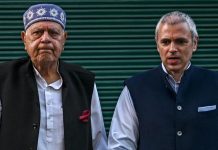 On November 5, posters signed by the militant outfit Hizbul Mujahideen appeared in Dhandal and Gurmal areas of Doda district of Chenab Valley, asking people to boycott the ensuing Panchayat polls. The posters emerged days after the suspected militants shot dead the senior BJP leader, Anil Parihar, 52, and his brother Ajit Parihar, 55, while they were on their way home.
On November 5, posters signed by the militant outfit Hizbul Mujahideen appeared in Dhandal and Gurmal areas of Doda district of Chenab Valley, asking people to boycott the ensuing Panchayat polls. The posters emerged days after the suspected militants shot dead the senior BJP leader, Anil Parihar, 52, and his brother Ajit Parihar, 55, while they were on their way home.
The successive developments have created fears about the revival of an otherwise long dead militancy in the region that equals Kashmir Valley in geographical size. Split more or less evenly between Hindus and Muslims — albeit latter command a slim majority — Chenab Valley, as the region is popularly called, was declared largely free of militancy over the past one and a half decade. Until 2016, the region had just three militants who too were subsequently killed.
What has shifted the ground in Chenab? The spillover of the militancy from Kashmir is the obvious answer. The region’s politics is the other. Muslims of the region which form 58 percent of the population are from Kashmiri ethnic stock and therefore trace their ideological and political outlook to Kashmir Valley, while as Hindus are of mixed Kashmiri and Dogra descent and identify themselves with Hindu majority Jammu and mainland India.
On the other hand, separatist politics of Kashmir has often resonated in Chenab Valley and run up against pro-New Delhi stance of Hindus. Chenab was a hub of the secessionist politics through sixties and early seventies when Sheikh Abdullah led Plebiscite Front found some of its most vocal advocates in the region. But before the outbreak of armed separatist campaign in 1989 both communities had found a way of getting around their differences and retain a peaceful social engagement.
But three decades of relentless bloodletting in the state as part of the ongoing separatist movement has unhinged the old communal bonds. The distrust and suspicion runs deep, bordering at times on paranoia. Rise of the BJP as the dominant political force in Jammu province has further strained the communal ties and in turn sharpened the divergence in the ideological affiliations of the two communities: Muslims hurtled politically closer to Kashmir Valley and its separatist tinged politics and Hindus got drawn to a nationalist discourse championed by the BJP. This division, in turn, determines the outcome of the polls in the region. Despite being a region where Muslims enjoy a modest majority, the BJP won 2014 Lol Sabha seat from the area: The trick was simple: the BJP was able to consolidate Hindu vote in its favour but Muslim vote split into Congress, National Conference and the PDP.
But the local political factors are not necessarily the cause of militancy. Kashmir observers see the signs of revival of militancy in Chenab Valley as the organic expansion of the ongoing violence in the Valley.
“South Kashmir and Chenab Valley are adjacent to each other. So, it is but natural that the rise in militancy in South Kashmir would rub off on the Chenab Valley,” says Gowhar Geelani, a political commentator. “Also, the militancy in the state operates in a certain historical and political context. It will always find a conducive environment for its growth unless steps are taken to address this context”.
Local faultlines
While there is a tendency to attribute the renewed drift towards militancy in Chenab Valley to the spillover from Kashmir Valley, there are also very powerful local factors that keep Chenab on edge. Both Hindus and Muslims have a reason to be deeply skeptical of each other. And this mutual suspicion between the communities is something on which much of local politics thrives.
Hindus harbour a deep fear about the revival of separatist militancy in the region.
And Muslims have a reason to be skeptical about the government backed armed groups of Hindu villagers called Village Defence Committees (VDCs). The VDCs are supposed to bar the entry of militants into their villages and also take them on.
There have been six major massacres of Hindus by militants in Chenab Valley over the past three decades: 17 killed at Sarthal in April 1993, 16 at Barshalla in January 1996, 17 at Sumbar in May 1996, 25 at Chapnari in June 1998, 35 at Kalaban in August 1998 and 22 at Kulhand in May 2006.
It was in response to these massacres that the government in 1996 took steps to arm the villagers. The offer to take up arms was made to both communities but Muslims refused to do so. There were two primary reasons for this. One, Muslims sympathised with the separatist cause and consequently identified with the militants, a large number of whom were local boys. Second, they feared that their decision to accept government arms will align them with the government position on Kashmir pitting militants against them.
There are 26,567 VDC members fighting militancy in 10 districts of Jammu province and Leh district of Ladakh and around 96 per cent of them are Hindus.
Three districts of Chenab Valley, a part of Jammu province, reflect the same picture. In Kishtwar, where the ratio of Hindus to Muslims is 40:60, 3174 out of 3287 VDC members are Hindus. In Doda, with a 30:70 ratio, 5874 out of VDC members are Hindus. In Ramban, with 40:60 ratio, 2697 out of 2901 VDC members are Hindus.
But this arming of one community to fight the militants from another community has over the years taken its toll on the inter-communal relations. And the potential fresh wave of militancy is likely to make things worse.
Stirrings of fresh militancy
Before the killing of Parihar brothers there have been two militant attacks in Chenab Valley this year: In May, a special police officer was killed and another injured when militants attacked their post in Tantra in Doda district.
Similarly, in June, an SSB jawan was killed and another injured when their patrol party was attacked in Banihal area of Ramban district. The militants fled from the scene with the service rifles of the slain and injured SSB personnel.
According to police estimate, there are just three listed militants active in Kishtwar district, one of them, Jehangir, the oldest surviving militant in the region. In July, however, a labourer Abid Hussain Bhat of Sazan village, around 25 from Doda town, joined Lasker-i-Toiba. The news spread through social media. Now, security agencies suspect Bhat might have since recruited more youth across Chenab.
Though, there have been some attempts to revive militancy in the region over the past few years also, they didn’t succeed. In 2015, two special police officers had joined Hizbul Mujahiddin but they were killed within a month. It was first encounter in Doda district after 2011.
But as the killing of Parihar brothers shows, this time round the militancy in Chenab Valley may have been able to struck some roots. And if this is the case, much like Kashmir Valley, the region looks headed for another round of turmoil.
letters@tehelka.com












